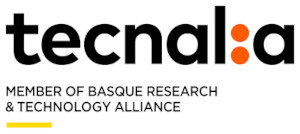Fundación Tecnalia R&I

Fundación TECNALIA Research and Innovation is the largest private non-profit applied research center in Spain and the fifth in Europe, employing more than 1,400 people (248 PhD) and with income of 110 Million € in 2018.
The whole team at TECNALIA has one GOAL: to transform knowledge into GDP, meaning wealth to improve people’s quality of life by generating business opportunities for industry. TECNALIA is committed to generate major impacts in economic terms, by means of innovation and technological development, addressed by 6 business divisions, covering economic sectors of Industry and Transport, Information and Communication Technologies, Building, Energy and Environment, Innovation Systems and Health and Quality of Life. Furthermore, TECNALIA created TECNALIA VENTURES in 2012 an independent TTO (Technology Transfer office) designed for exploitation and transfer of research results. TECNALIA has been granted over 658 patents and promoted more than 20 spin-off companies.
TECNALIA is a key agent in the ERA – European Research Area, holding position 12th among RECs and 26th overall in EC’s 6th FP7 Monitoring Report 2012. He has participated in 377 FP7 projects, coordinating 81 of them. By February 2018, TECNALIA participates in 163 H2020 projects coordinating 33 of them.
The Materials & Processes Dept. of the Energy and Environment Division will be involved in the project. It is constituted by 72 scientists and technicians (including 25 PhD and 14 PhD students). Two groups of this department will work on this project:
a) The Membrane Technology and Process Intensification group (14 persons, including 6 PhD and 3 PHD students) involved in the development of materials and membranes and their use in different applications: i) gas separation applications (such as pre- and post- combustion carbon dioxide capture, natural gas purification, air separation and olefin/paraffin separation), ii) hydrogen production, iii) water separation and iii) process intensification using membrane reactors. The group has applied its background in materials, surface engineering and industrial processes to the development of membranes and the design and development of membrane modules and membrane reactors. The membrane group works with polymeric, inorganic (metallic and carbon) membranes (i.e. Pd-based thin film membranes by electroless plating and/or PVD, pore fill Pd membranes, Carbon Molecular Sieve membranes (CMSMs)) and mixed matrix membranes. Beside defining the procedures for the manufacture of the membranes, the group has designed and developed its own equipment for:
i) the fabrication of hollow fibres and he has experienced on polymeric asymmetric hollow fibre spinning for gas separation applications.
ii) Manufacturing long (50 cm long) Pd-based supported membranes.
iii) Manufacturing ~15 cm long CMSMs supported membranes (now working to develop 40 cm long CMSMs).
b) The Waste Valorisation group focuses mainly on metallurgy and has extensive capabilities of pyro-, hydro-, and ionometallurgies (ionic liquid-based metallurgy) for critical and high-tech metal recovery from secondary wastes. They develop technology and generate business opportunities for eco-industry and other industrial sectors, focusing our activities in solving their environmental problems by obtaining value from waste obtaining new resources (secondary raw materials and/or energy), developing overall solutions for safe management of waste, designing and validating processes from lab scale up to pilot/demonstration plants. Moreover, basic engineering expertise (to define CAPEX and OPEX), transfer lab scale data for piloting and pilot construction are also available in our group. In addition to metallurgy, we use ionic liquids for different industrial applications (e.g. electrolytes for batteries or electrodeposition, desulfurization, lubricants etc.) and have expertise for designing, synthesising and characterizing of different categories of ionic liquids including task specific ionic liquids and deep eutectic solvents.
